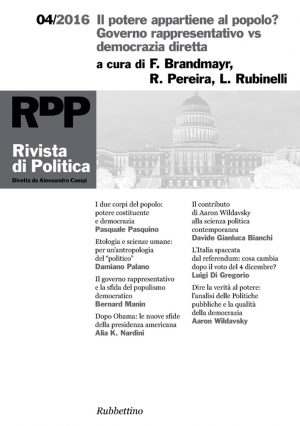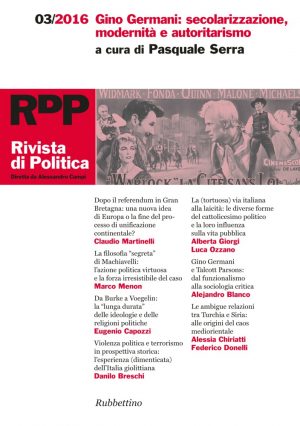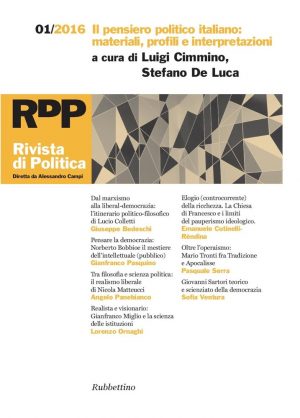02/2016 – Il malessere della Francia tra politica, storia e memoria. A cura di Michele Marchi
ISSN: 2037-495X
8,50€ – 11,00€
Descrizione
Sommario:
congetture & confutazioni
La politica estera tedesca post-unificazione: una nuova Weltpolitik? Emanuele Schibotto
Un’Europa post-eroica? Giuseppe Romeo
Il populismo e i suoi (incerti) confini Laura Santi Amantini
archivio del realismo politico
Il conservatorismo politico di David Hume Spartaco Pupo
La popolosità delle nazioni antiche David Hume
c’era una volta la francia: la paura, la speranza
Il malessere della Francia, tra politica, storia e memoria
Francia 2016. Istantanee del Paese, ad un anno dal voto presidenziale Michele Marchi
La Quinta Repubblica: un’analisi sistemica Sofia Ventura
Dal “Merkozy” al rapporto Merkel-Hollande: cosa resta di un “polveroso” asse Parigi-Berlino Emanuele Schibotto
Riconoscere e sorvegliare. La gestione pubblica dell’islam in Francia Philippe Portier
La nazione europea e il dispositivo teologico-politico contemporaneo Pierre Manent
La Francia e i suoi «secoli di piombo»: una storia francese del terrorismo Gilles Ferragu
Archeologia del pensiero neoreazionario. Radici, mito, immaginario Guerino Nuccio Bovalino
politica e verità: ragioni e azioni comuni
La «città» dei diritti umani Giulio De Ligio
Le sfide della teologia politica nella modernità Bernard Bourdin
La persistenza della politica. Hannah Arendt e la modernità delle scienze sociali Francesco Callegaro
Abstracts
Spartaco Pupo, The Political Conservatism of David Hume
Although it is an almost obvious fact, the political conservatism of David Hume has been subject to many manipulations within Italian historiography. The latter has attributed Hume a distorted character: champion of progressivism and ambiguous, “worrying”, political thinker. Through the analysis of the main writings of Hume, and on the basis of authoritative critical interpretations mainly offered by Anglo-American scholars, this article aims to establish the truth about Hume’s political thought, proving that he was the first conservative thinker in the modern world, anticipating the counter-revolutionary thesis of Edmund Burke and proposing a “political” conservatism in the true sense of the term – that is, secular, devoid of the influence of religious traditionalism and wary of radicalism, violent innovation, and rationalist arrogance.
David Hume, Of the Populousness of Ancient Nations
Before 1752, when this essay was first published, there were no demographic statistics for any city in the world. In circulation, there were only some conjectures on changes in population over the centuries, and from these sprang fears that nations were either witnessing an imminent demographic explosion or a dramatic depopulation. In his essay, David Hume provides, for the first time in the modern age, a framework for understanding the political and economic consequences of population growth and depopulation, carefully investigating the differences between the ancient and modern world with reference to the influence of slavery, commerce, crafts and trades, development of the arts and economy. Hume proves to be a realist interested in “real history”, the “beginning” of which he makes coincide with “the first page of Thucydides”, and refutes all the exaggerations and misrepresentations of other ancient writers, especially with regard to the populousness and greatness of Rome and Italy.
Michele Marchi, France: A Pictures from the Country, One Year before the Vote
The aim of this essay is to draw together different forms of analysis in the attempt to understand the long-lasting French crisis. The starting point is the growing perception of the ongoing crisis within public opinion. The second part of the analysis gives priority to the historical roots of today’s problems. In this part of the essay, particular attention is given to the long “Mitterrand kingdom”. The third part investigates the “European problem”. In fact, the author is convinced that one may not understand the current French predicament, if one does not analyse the conflicting relationship between Paris and the European Union. The last part of the article is devoted to current political events. Here, the purpose is to underline the increasing difficulties faced by the most important political cultures of the country. The “French dilemma” is also connected to the failure of the socialist and neo-Gaullist parties to offer solutions for facing the enduring crisis of European liberal democracies.
Sofia Ventura, The French Fifth Republic: A Systemic Analysis
After its difficult start, the new institutional system created by de Gaulle in 1958 showed a great efficacy in sustaining French social and economic growth. Even when the “Trente Glorieuses” ended, the institutional system was able to deal with the crisis of the party system and the emergence of new issues (such as Europeanization, the end of the Cold War, the growth of the Front National party, unemployment, lack of economic growth, and so on…). Over the past few years, however, new findings connected to the transformation of the system into a sort of presidential one (after the reduction to five years of the presidential term) and the domination of TV and new media have emerged. But also if one choses to analyse French political crisis from this point of view, it is possible to find several important issues connected to the transformation of all European political systems. So, after sixty years the Fifth Republic can already be considered a model throughout the world.
Emanuele Schibotto, From the “Merkozy” to the Merkel-Hollande Relationship: What is Left of a “Dusty” Axis Paris-Berlin
During the last four years, the Franco-German partnership has lost steam, with both Paris and Berlin losing sight of the paramount importance of their relationship. The strategic balance that was held until Sarkozy is long gone. Now, a Germany with an ever greater leverage on European politics faces a France mired in deep economic troubles. With no symmetry to sustain the partnership, both countries have downgraded their own commitment in search of consensus, thus jeopardising European stability. A strong Franco-German partnership is one of the cornerstones of the European Union – and the pursuing of the national interests of the EU’s two largest economies still works as a win-win situation.
Philippe Portier, Recognize and Supervise: Islam’s Public Management in France
The shift, in the 1970s, from a working immigration to an immigration of settling, has led to the creation in France of an important Muslim community. The visibility and the assertion of its religion have kept increasing, not without arousing tensions with the principles of secularism. As intellectual controversies over the question of Islam become increasingly important, the state has been forced to produce new public policies. Philippe Portier stresses that the “Muslim” politics of the French government has been twofold: On the one hand, it has emphasized the necessity of granting to the Islamic religion a public recognition; on the other hand, it has reasserted the obligation for them to respect certain principles inherent to secularism.
Pierre Manent, The European Nation and the Theological-political Contemporary “Device”
The fragmentation and the riots that threaten Europe pose the need for a political and spiritual reflection. To unite men, it is not enough to guarantee rights, proclaim secularism, or preserve institutional separations. It is also necessary to identify principles of order and energy. We should always ask ourselves in which human association, in what political form, the spiritual masses of the world can find a common life – whether, as Manent argues, this political form is still that of the “nation” or of “national community”.
Gilles Ferragu, France and its “secoli di piombo”: A French History of Terrorism
Is terrorism a French invention? Political violence has a long history, but the concept of terrorism – as a policy and as a way of governing through terror – only appeared during the French Revolution, in the midst of the Jacobin State. It became a weapon for political minorities (republicans, monarchist, anarchists, etc.) during the long nineteenth century, marked by ideologies, attacks, and trials. In fact, terrorism haunts French history – and has done so to present day – and the legitimating of violence has led, in a country proud of its revolution, to a political debate that has transformed the face of terrorism in history.
Guerino Nuccio Bovalino, An Archaeology of the Neo-reactionary Thought: Roots, Myths, and Imaginary
This article is an assessment of the structures acquired by politics in new media era, with the end of the grand narratives, and the crisis of classical ideologies. In particular, an analysis about the French neo-reactionary phenomenon is attempted, singling out its roots in the crisis of the European project and the national and individual identity dissipation. Moreover, it tries to spell out the cultural mythologies of reference for its interpreters, and the political conjugations of these neo-identity and neo-sovereigntist ideas.
Bernard Bourdin, The Challenges of Political Theology in Modernity
Within the Christian context, the challenges posed by political theology are twofold. First, as a consequence of Christianity becoming a religion in the fourth century, its newfound status created an ambivalent relationship between the “spiritual” and the “temporal”. Second, this had implications for the political, which cannot accept a competing sphere – as evidenced by the rise of modern political philosophy with its concepts of state and sovereignty. Is this dual challenge not the source of the advent of liberal democracy and the separation of politics and religion? If this is the case, would the status of Christian political theology not be the inverse mirror of this separation on the basis of which it can still be understood in the early twenty-first century? If this historical interpretation is relevant, a way is opened to confront two emerging challenges: the new approaches to the liberal separation of religion from politics, and the proposition of a believer’s citizenship. This is the task of a theology of the political.
Francesco Callegaro, The Persistence of Politics. Hannah Arendt and the Modernity of the Social Sciences
Hannah Arendt’s political thought intends going beyond the opposition between ancient and modern, and question all established forms of knowledge, whether philosophical or scientific, inasmuch as these take on the form of a theory seeking the criterion of politics beyond what emerges in the acting in common of men and women. If scholars have frequently focused their attention on her criticism of ancient political philosophy, and especially of Plato, in our opinion the testing ground for understanding Arendt’s thought should be sought in her critical confrontation with the modern social sciences. According to Arendt, these bring to an end the tendency to cover up political action, a tendency to which she responded by developing that specific category of action that lies at the heart of her thought. The goal of this essay is to reconstruct the criticism that Arendt levies against the social sciences, in order to reverse it from the inside. If we want to grasp the persistence of politics in modernity, we must develop a new thought, stemming not from a twofold refusal, but from a new alliance between political philosophy and the social sciences.
Giulio De Ligio, The “City” of Human Rights
Rights seem to be the alpha and omega of the European discourse. In them we find the condition and the end of all claims and all ties. We do not struggle to recognize the evils that they avert, nor the precariousness of the freedoms and guarantees that we owe them. The very question that has concerned them for centuries becomes, therefore, difficult to formulate. It is however far from certain whether social experience, political action, and the whole human phenomenon can be reduced to the logic of rights. On closer inspection, democracies and current tests continue to demand the determination of the life contents of man, who holds them. Rights do not exempt the people of Europe from addressing the issue of the city.






